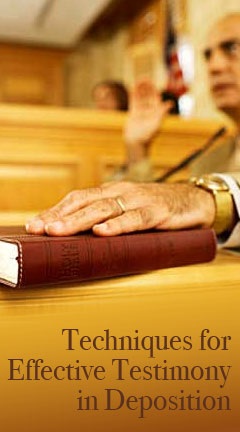Aviso de archivo
Esta es una página de archivo que ya no se actualiza. Puede contener información desactualizada y es posible que los enlaces ya no funcionen como se pretendía originalmente.
Home | Glossary | Resources | Help | Course Map
The expert's deposition examination may well follow the general content of Module 7: Discovery, Topic 4 and Appendix — Deposing an Adverse Witness, although the degree of detail may vary, depending on the deposing attorney's objectives and inclinations. This format is not applicable in every case, but the following general guidelines are:
- The papers and materials the expert uses to refresh his memory before or during testimony may be ordered to be produced. Revealing these documents, one at a time, may be best:
- If the expert has not been subpoenaed to produce documents, or
- If the expert's report was provided to opposing counsel ahead of time. Reviewing each document jogs the memory.
- The expert should not hesitate to ask for a recess if questioning seems intentionally tiring, or if the questions appear to be coming too rapidly. A short recess and stretch may allow the expert to feel more refreshed and focused.
- Remember that any discussions the expert has with counsel during the recess may be inquired into by the examining attorney when the deposition resumes. For that reason, the expert should not discuss inconclusive evidence, facts or hypotheses in dispute with counsel during recess consultation.
- It may be appropriate and proper for the expert to have his own attorney attend the deposition, in case inquiries are made into other clients' confidential matters about which the expert is prohibited from disclosing.
- The deposition room represents a "full court press." There should be no off-the-record or informal discussions with proffering counsel. Such conversations are a trap for the unwary and inexperienced expert. When the deposition is concluded, the expert should not ask the proffering attorney how the expert did. The expert will learn soon enough.
- The expert should gauge the method and manner of approach of the examining attorney early in the deposition process. Is the approach aggressive and tenacious? Does he play "Mr. Nice Guy" to the hilt with the expert? The expert's early analysis will be important, for both deposition and trial. The opposing attorney might vary his style to throw the expert witness off balance. Be alert to such changes in demeanor; they may signal an attempt to trip or trap the expert by creating a false sense of security.
- The expert should treat everyone at the deposition politely. Jokes or flippant comments are inappropriate. Maintain a professional demeanor at all times but do not appear cold.
Part of the expert's effectiveness will be measured by his ability to anticipate what the cross-examination may entail. Deposing an Adverse Witness (Appendix) can help the expert practice and prepare for almost any eventuality.
At some point after the deposition, a transcript should be made available for the expert to review. The expert should make the minimum number of corrections or changes possible because any changes he makes can become the basis for cross-examination at trial. An important "yes" when the expert should have said "no" will probably be a target for the opposing counsel.
The expert should always consult with counsel for an explanation of the possible implications of any changes in the transcribed deposition testimony. After examining the transcript, the expert will be asked to sign an affidavit that approves the transcription as written, or with modifications.
If the expert does not examine the transcript, then most local rules provide that the deposition may be filed without the expert's signature, with approval being assumed. Therefore, the expert should always review the transcription for transmission or typographical errors.
Additional Online Courses
- What Every First Responding Officer Should Know About DNA Evidence
- Collecting DNA Evidence at Property Crime Scenes
- DNA – A Prosecutor’s Practice Notebook
- Crime Scene and DNA Basics
- Laboratory Safety Programs
- DNA Amplification
- Population Genetics and Statistics
- Non-STR DNA Markers: SNPs, Y-STRs, LCN and mtDNA
- Firearms Examiner Training
- Forensic DNA Education for Law Enforcement Decisionmakers
- What Every Investigator and Evidence Technician Should Know About DNA Evidence
- Principles of Forensic DNA for Officers of the Court
- Law 101: Legal Guide for the Forensic Expert
- Laboratory Orientation and Testing of Body Fluids and Tissues
- DNA Extraction and Quantitation
- STR Data Analysis and Interpretation
- Communication Skills, Report Writing, and Courtroom Testimony
- Español for Law Enforcement
- Amplified DNA Product Separation for Forensic Analysts


